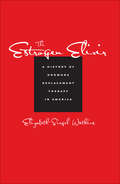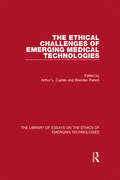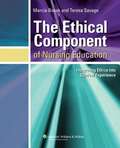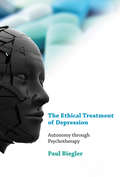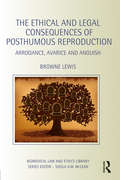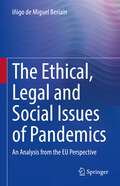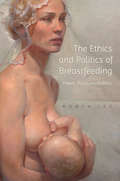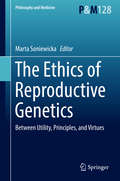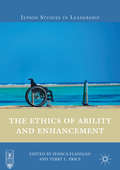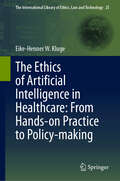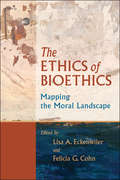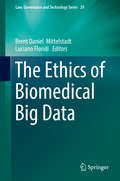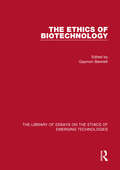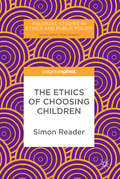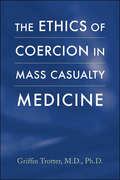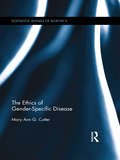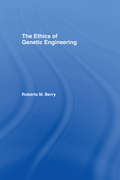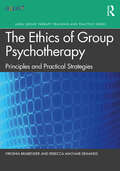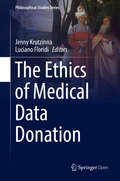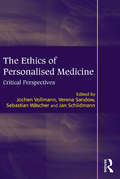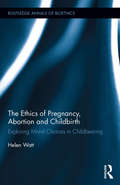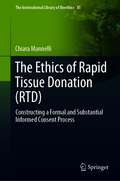- Table View
- List View
The Essentials of Psychodermatology
by Mohammad Jafferany Bárbara Roque Ferreira Arsh PatelPatients with psychocutaneous disease may present to multiple professionals to seek care. The multidimensional nature of the conditions can lead to specialists being fearful of how to properly manage patients. For example, a dermatologist may be unfamiliar and uncomfortable with acquiring sensitive psychosocial information and a psychiatrist may not know management protocols of wound care related to the patient’s condition. With the basic information provided in The Essentials of Psychodermatology, healthcare providers can increase their comfort and become less hesitant when making decisions in determining the proper treatment course and assessing the need for referral. This book provides vital information for a multidisciplinary audience to spark collaboration, increased awareness, and ultimately, improved patient-care and will find audience with: Healthcare providers from multiple diverse fields such as, but not limited to, family medicine, dermatology, and psychiatry; Physicians, physician’s assistants, nurses, psychologists, and students with exposure to patients with psychocutaneous conditions and/or a special interest in the field; and Professors, educators, and researchers with an interest in psychodermatology or interdisciplinary medicine.
The Estrogen Elixir: A History of Hormone Replacement Therapy in America
by Elizabeth Siegel WatkinsIn the first complete history of hormone replacement therapy (HRT), Elizabeth Siegel Watkins illuminates the complex and changing relationship between the medical treatment of menopause and cultural conceptions of aging. Describing the development, spread, and shifting role of HRT in America from the early twentieth century to the present, Watkins explores how the interplay between science and society shaped the dissemination and reception of HRT and how the medicalization—and subsequent efforts toward the demedicalization—of menopause and aging affected the role of estrogen as a medical therapy. Telling the story from multiple perspectives—physicians, pharmaceutical manufacturers, government regulators, feminist health activists, and the media, as well as women as patients and consumers—she reveals the striking parallels between estrogen’s history as a medical therapy and broad shifts in the role of medicine in an aging society.Today, information about HRT is almost always accompanied by a laundry list of health risks. While physicians and pharmaceutical companies have striven to develop the safest possible treatment for the symptoms of menopause and aging, many specialists question whether HRT should be prescribed at all. Drawing from a wide range of scholarly research, archival records, and interviews, The Estrogen Elixir provides valuable historical context for one of the most pressing debates in contemporary medicine.
The Ethical Challenges of Emerging Medical Technologies (The\library Of Essays On The Ethics Of Emerging Technologies Ser.)
by Arthur L. Caplan Brendan ParentThis collection of essays emphasizes society’s increasingly responsible engagement with ethical challenges in emerging medical technology. Expansion of technological capacity and attention to patient safety have long been integral to improving healthcare delivery but only relatively recently have concepts like respect, distributive justice, privacy, and autonomy gained some power to shape the development, use, and refinement of medical tools and techniques. Medical ethics goes beyond making better medicine to thinking about how to make the field of medicine better. These essays showcase several ways in which modern ethical thinking is improving safety, efficacy and efficiency of medical technology, increasing access to medical care, and empowering patients to choose care that comports with their desires and beliefs. Included are complimentary ethical approaches as well as compelling counter-arguments. Together, the articles demonstrate how improving the quality of medical technology relies on every stakeholder -- not just medical researchers and scientists -- to assess each given technology’s strengths and pitfalls. This collection also portends one of the next major issues in the ethics of medical technology: developing the requisite moral framework to accompany shifts toward patient-centred personalized healthcare.
The Ethical Component of Nursing Education: Integrating Ethics Into Clinical Experience
by Marcia Sue DeWolf Bosek Teresa A. SavageThis new primary ethics textbook is uniquely designed to integrate ethics content into the clinical nursing curriculum and to be used throughout the nursing curriculum. This textbook is designed to ensure that the nursing student benefits from a systematic coverage of clinical ethics, moving from simple ethical issues to more complex. The book covers clinical ethics in theory and practice by building upon the foundations of ethics using the traditional clinical practice content areas such as children and adolescents, adult, critical care, and women's health.
The Ethical Treatment of Depression: Autonomy through Psychotherapy (Philosophical Psychopathology)
by Paul BieglerA philosopher argues there is an ethical imperative to provide psychotherapy to depressed patients because the insights gained from it promote autonomy.One in six people worldwide will experience depression over the course of a lifetime. Many who seek relief through the healthcare system are treated with antidepressant medication; in the United States, nearly 170 million prescriptions for antidepressants were written in 2005, resulting in more than $12 billion in sales. And yet despite the dominance of antidepressants in the marketplace and the consulting room, another treatment for depression has proven equally effective: psychotherapy—in particular, cognitive behavior therapy (CBT). Antidepressants can lift mood independent of a person's understanding of symptoms or stressors. By contrast, CBT teaches patients skills for dealing with distressing feelings, negative thoughts, and causal stressors. In The Ethical Treatment of Depression, Paul Biegler argues that the insights patients gain from the therapeutic process promote autonomy. He shows that depression is a disorder in which autonomy is routinely and extensively undermined and that physicians have a moral obligation to promote the autonomy of depressed patients. He concludes that medical practitioners have an ethical imperative to prescribe psychotherapy—CBT in particular—for depression. To make his case, Biegler draws on a wide philosophical literature relevant to autonomy and the emotions and makes a comprehensive survey of the latest research findings from the psychological sciences. Forcefully argued, densely researched, and engagingly written, the book issues a challenge to physicians who believe their duty of care to depressed patients is discharged by merely writing prescriptions for antidepressants.
The Ethical and Legal Consequences of Posthumous Reproduction: Arrogance, Avarice and Anguish (Biomedical Law and Ethics Library)
by Browne LewisPosthumous reproduction refers to the procedure that enables a child to be conceived using the gametes of a dead person. Advances in reproductive technology mean it is now possible to assist in creating a life after you die, and in recent years the number of women who have attempted to get pregnant using posthumous reproduction has increased. However, the law in many jurisdictions has not put regulations in place to deal with the ethical and legal consequences that arise as a result of posthumous reproduction. This is the first book to exclusively focus on posthumous reproduction. The book comprehensively explores the legal and ethical issues surrounding posthumous reproduction in a number of jurisdictions including the US, Israel, the UK and France. The book looks at a number of issues including: ascertaining the wishes of the dead and protecting the reproductive rights of men who have deposited frozen sperm in clinics prior to their deaths; cases involving people who want to acquire fresh sperm from deceased or incompetent men and determining who should have the right to accept the sperm; identifying the parents of the posthumously conceived child; and discussing the need to promote the best interests of the child. The book critically examines the current laws that are in place and proposes additional regulations and policies in order to effectively regulate posthumous reproduction.
The Ethical, Legal and Social Issues of Pandemics: An Analysis from the EU Perspective
by Iñigo de Miguel BeriainThis book proposes an ethical and legal framework to improve the responses to social issues related not only to the current SARS-CoV-2 pandemic, but also to future pandemics. Its contents cover the issues that are likely to be most controversial in any public health crisis. It starts by discussing non-pharmacological measures, such as the appropriateness of confinement, how to control compliance with public health measures and the ethical, legal and social acceptability of health certificates. Then it turns to issues related to the production, distribution and administration of vaccines, with a particular focus on the design and implementation of vaccination policies. Finally, it analyses the most appropriate criteria to develop a triage, when the situation brings us to this terrible scenario. The analyses presented in this book are based on the ethical and legal frameworks, as well as the social context, of the European Union, and aims to address the main dilemmas faced by any liberal democracy dealing with a pandemic: how to reconcile the defense against a public health crisis together with a respect for fundamental rights and freedoms. The European legal systems have developed a number of conceptual tools designed to ensure that there is no room for arbitrariness in the restrictions introduced by the political power in emergency situations, and this book builds upon these tools. The Ethical, Legal and Social Issues of Pandemics: An Analysis from the EU Perspective is a predominantly practice-oriented book, which will help policy makers to adopt policies that effectively combine public health needs with individual rights and freedoms. It will also help health care givers to understand better the ethical and legal issues involved in their work and citizens, in general, to participate in public decision making in an informed manner. Finally, it will help to design tools that faithfully comply with existing fundamental rights standards.
The Ethics and Politics of Breastfeeding: Power, Pleasure, Poetics
by Robyn LeeResponding to the most widely read breastfeeding manual, La Leche League’s The Womanly Art of Breastfeeding, Robyn Lee’s The Ethics and Politics of Breastfeeding explores breastfeeding as an art that must be developed through skillful application of effort and distinguished from a merely natural or physiological process. The Ethics and Politics of Breastfeeding challenges the dominant understanding of breastfeeding and cultivates an alternative conception as an ethical, embodied practice of the self. Drawing on the work of Michel Foucault, Emmanuel Levinas, and Luce Irigaray, Lee develops a new understanding of breastfeeding as an "art of living," where the practice is reconsidered in the light of ongoing social inequalities.
The Ethics of Reproductive Genetics: Between Utility, Principles, And Virtues (Philosophy and Medicine #128)
by Marta SoniewickaThis book is aimed at analyzing the foundations of medical ethics by considering different moral theories and their implications for judgments in clinical practice and policy-making. It provides a review of the major types of ethical theory that can be applied to medical and bioethical issues concerning reproductive genetics. In response to the debate on the most adequate ethical doctrine to guide biomedical decisions, this book formulates views that capture the best elements in each, bearing in mind their differences and taking into account the specific character of medicine. No historically influential position in ethics is by itself adequate to be applied to reproductive decisions. Thus, this book attempts to offer a pluralistic approach to biomedical research and medical practice. One usually claims that there are some basic principles (non-maleficence, beneficence, confidentiality, autonomy, and justice) which constitute the foundations of bioethics and medical ethics. Yet these principles conflict with each other and one needs some criteria to solve these conflicts and to specify the scope of application of these principles. Exploring miscellaneous ethical approaches as introduced to biomedicine, particularly to reproductive genetics, the book shall elucidate their different assumptions concerning human nature and the relations between healthcare providers, recipients, and other affected parties (e.g. progeny, relatives, other patients, society). The book attempts to answer the question of whether the tension between these ethical doctrines generates conflict in the field of biomedicine or if these competing approaches could in some way complement each other. In this respect, lecturers and researchers in bioethics would be interested in this reading this book.
The Ethics of Ability and Enhancement
by Terry L. Price Jessica FlaniganThis book explores our ethical responsibilities regarding health in general and disabilities in particular. Disability studies and human enhancement stand out as two emerging areas of research in medical ethics, prompting debates into ethical questions of identity, embodiment, discrimination, and accommodation, as well as questions concerning distributive justice and limitations on people's medical rights. Edited by two ethicist philosophers, this book combines their mastery of the theoretical debates surrounding disability and human enhancement with attention to real world questions that health workers and patients may face. By including a wide range of high-quality voices and perspectives, the book provides an invaluable resource for scholars who are working on this important and emerging area of leadership and health care ethics.
The Ethics of Animal Research: Exploring the Controversy (Basic Bioethics)
by Jeremy R. GarrettA balanced, accessible discussion of whether and on what grounds animal research can be ethically justified.An estimated 100 million nonhuman vertebrates worldwide—including primates, dogs, cats, rabbits, hamsters, birds, rats, and mice—are bred, captured, or otherwise acquired every year for research purposes. Much of this research is seriously detrimental to the welfare of these animals, causing pain, distress, injury, or death. This book explores the ethical controversies that have arisen over animal research, examining closely the complex scientific, philosophical, moral, and legal issues involved.Defenders of animal research face a twofold challenge: they must make a compelling case for the unique benefits offered by animal research; and they must provide a rationale for why these benefits justify treating animal subjects in ways that would be unacceptable for human subjects. This challenge is at the heart of the book. Some contributors argue that it can be met fairly easily; others argue that it can never be met; still others argue that it can sometimes be met, although not necessarily easily. Their essays consider how moral theory can be brought to bear on the practical ethical questions raised by animal research, examine the new challenges raised by the emerging possibilities of biotechnology, and consider how to achieve a more productive dialogue on this polarizing subject. The book's careful blending of theoretical and practical considerations and its balanced arguments make it valuable for instructors as well as for scholars and practitioners.
The Ethics of Artificial Intelligence in Healthcare: From Hands-on Practice to Policy-making (The International Library of Ethics, Law and Technology #25)
by Eike-Henner W. KlugeThis book provides an ethical analysis of the ethical issues that arise in the design, nature and use of AIs as they are currently used in the delivery and planning of healthcare by hands-on healthcare professionals, institutional administrators and social policy makers. It suggests that while these issues overlap, they have distinct aspects in the respective domains. Among other things, it distinguishing between AIs as expert systems as they are currently constituted and AIs as based in quantum computers or as constituted of bio-printed material, indicates how this is evolving and outlines the ethically relevant issues that would then arise.
The Ethics of Bioethics: Mapping the Moral Landscape
by Lisa A. Eckenwiler, Felicia G. CohnStem cell research. Drug company influence. Abortion. Contraception. Long-term and end-of-life care. Human participants research. Informed consent. The list of ethical issues in science, medicine, and public health is long and continually growing. These complex issues pose a daunting task for professionals in the expanding field of bioethics. But what of the practice of bioethics itself? What issues do ethicists and bioethicists confront in their efforts to facilitate sound moral reasoning and judgment in a variety of venues? Are those immersed in the field capable of making the right decisions? How and why do they face moral challenge—and even compromise—as ethicists? What values should guide them? In The Ethics of Bioethics, Lisa A. Eckenwiler and Felicia G. Cohn tackle these questions head on, bringing together notable medical ethicists and people outside the discipline to discuss common criticisms, the field's inherent tensions, and efforts to assign values and assess success. Through twenty-five lively essays examining the field's history and trends, shortcomings and strengths, and the political and policy interplay within the bioethical realm, this comprehensive book begins a much-needed critical and constructive discussion of the moral landscape of bioethics.
The Ethics of Biomedical Big Data
by Luciano Floridi Brent Daniel MittelstadtThis book presents cutting edge research on the new ethical challenges posed by biomedical Big Data technologies and practices. 'Biomedical Big Data' refers to the analysis of aggregated, very large datasets to improve medical knowledge and clinical care. The book describes the ethical problems posed by aggregation of biomedical datasets and re-use/re-purposing of data, in areas such as privacy, consent, professionalism, power relationships, and ethical governance of Big Data platforms. Approaches and methods are discussed that can be used to address these problems to achieve the appropriate balance between the social goods of biomedical Big Data research and the safety and privacy of individuals. Seventeen original contributions analyse the ethical, social and related policy implications of the analysis and curation of biomedical Big Data, written by leading experts in the areas of biomedical research, medical and technology ethics, privacy, governance and data protection. The book advances our understanding of the ethical conundrums posed by biomedical Big Data, and shows how practitioners and policy-makers can address these issues going forward.
The Ethics of Biotechnology
by Gaymon Bennett, Fred HutchinsonThe essays collected in this volume provide students of ethics with essential tools for making sense of emerging biotechnical capacities and the turbulent power relations these capacities are bringing into the world. Unlike previous reference works in bioethics, which focus on specific domains of human activity (such as genetic research or biomedicine), this volume directs students’ attention to the underlying cultural and institutional forces that shape how biotechnologists approach the world, and teaches students how to weigh the ethical significance of these forces. This innovative approach to the ethics of biotechnology, detailed in the volume’s introduction, equips students to track the dynamic interplay of biology, digital technology and the high-tech economy which is remaking the living world today and the human relation to it.
The Ethics of Care: Moral Knowledge, Communication, and the Art of Caregiving (Routledge Studies in Health and Social Welfare)
by Stuart J. Murray Alan BlumBeginning with a focus on the ethical foundations of caregiving in health and expanding towards problems of ethics and justice implicated in a range of issues, this book develops and expands the notion of care itself and its connection to practice. Organised around the themes of culture as a restraint on caregiving in different social contexts and situations, innovative methods in healthcare, and the way in which culture works to position care as part of a rhetorical approach to dependency, responsibility, and justice, The Ethics of Care presents case studies examining institutional responses to end-of-life issues, the notion of informed consent, biomedicine, indigenous rights and postcolonialism in care and theoretical approaches to the concept of care. Offering discussions from a variety of disciplinary approaches, including sociology, communication, and social theory, as well as hermeneutics, phenomenology, and deconstruction, this book will appeal to scholars across the social sciences with interests in healthcare, medicine, justice and the question of how we think about care as a notion and social form, and how this is related to practice.
The Ethics of Choosing Children
by Simon ReaderThis book takes the contentious issue of designer babies and argues against the liberal eugenic current of bioethics that commends the logic and choice regimes of selective reproduction. Against conceptions of Procreative Beneficence that trade on a disregard for the gifts of maternal bodies, it seeks to recover a thought of maternal giving and a more hospitable ethic of generational beneficence. Exploring themes of responsibility, gift and natality, the book refigures the experience of reproduction as the site of an ethical response to future generations, where refusal to choose one's children is one virtuous response. The book will appeal to anyone with an interest in reproductive ethics, feminist thought and those seeking principled grounds for resisting the technologies of choosing children.
The Ethics of Coercion in Mass Casualty Medicine
by Griffin TrotterDisasters, both natural and manufactured, provide ample opportunities for official coercion. Authorities may enact quarantines, force evacuations, and commandeer people and supplies—all in the name of the public's health. When might such extreme actions be justified, and how does a democratic society ensure that public officials exercise care and forethought to avoid running roughshod over human rights?In The Ethics of Coercion in Mass Casualty Medicine, Griffin Trotter explores these fundamental questions with skepticism, debunking myths in pursuit of an elusive ethical balance between individual liberties and public security. Through real-life and hypothetical case studies, Trotter discusses when forced compliance is justified and when it is not, how legitimate force should be exercised and implemented, and what societies can do to protect themselves against excessive coercion. The guidelines that emerge are both practical and practicable. Drawing on core concepts from bioethics, political philosophy, public health, sociology, and medicine, this timely book lays the groundwork for a new vision of official disaster response based on preventing and minimizing the need for coercive action.
The Ethics of Gender-Specific Disease (Routledge Annals of Bioethics)
by Mary Ann CutterOur understanding of gender carries significant bioethical implications. An errant account of gender-specific disease can lead to overgeneralizations, undergeneralizations, and misdiagnoses. It can also lead to problems in the structure of health-care delivery, the creation of policy, and the development of clinical curricula. In this volume, Cutter argues that gender-specific disease and related bioethical discourses are philosophically integrative. Gender-specific disease is integrative because the descriptive roles of gender, disease, and their relation are inextricably tied to their prescriptive roles within frames of reference. An integrative account of gender-specific disease carries ethical implications because our understanding of gender-specific disease is evaluative, and our evaluations of gender-specific disease entail judgments concerning the praiseworthiness and blameworthiness of a clinical event. Cutter supports a "both/and" emphasis on context and integration in relation to gender-specific disease and bioethical analyses. While the text mainly focuses on gender-specific diseases that affect women, Cutter also includes examples involving men, children, and members of the LGBT community.
The Ethics of Genetic Engineering (Routledge Annals of Bioethics #Vol. 4)
by Roberta M. BerryHuman genetic engineering may soon be possible. The gathering debate about this prospect already threatens to become mired in irresolvable disagreement. After surveying the scientific and technological developments that have brought us to this pass, The Ethics of Genetic Engineering focuses on the ethical and policy debate, noting the deep divide that separates proponents and opponents. The book locates the source of this divide in differing framing assumptions: reductionist pluralist on one side, holist communitarian on the other. The book argues that we must bridge this divide, drawing on the resources from both encampments, if we are to understand and cope with the distinctive problems posed by genetic engineering. These problems, termed "fractious problems," are novel, complex, ethically fraught, unavoidably of public concern, and unavoidably divisive. Berry examines three prominent ethical and political theories – utilitarianism, Kantianism, and virtue ethics – to consider their competency in bridging the divide and addressing these fractious problems. The book concludes that virtue ethics can best guide parental decision making and that a new policymaking approach sketched here, a "navigational approach," can best guide policymaking. These approaches enable us to gain a rich understanding of the problems posed and to craft resolutions adequate to their challenges.
The Ethics of Group Psychotherapy: Principles and Practical Strategies (AGPA Group Therapy Training and Practice Series)
by Virginia Brabender Rebecca MacNair-SemandsThe Ethics of Group Psychotherapy provides group psychotherapists with the ethical and legal foundation needed to engage in effective decision-making in their everyday group practices. This text provides readers with a framework for understanding ethical dilemmas through a review of major models of ethical thinking, including principlism, feminism and the ethics of care, and virtue ethics. The authors use this foundation to explore those problems emerging most routinely in group practice, among which are safeguarding members’ personal information, protecting members’ autonomy, and helping members to process differences—particularly those related to privilege and oppression—in a way that furthers interpersonal relations and social justice. Throughout the text, practical tools such as using assessments to aid in member selection and tracking progress and outcome through measurement-based care are offered that bolster the group psychotherapist’s effectiveness in ethical decision-making. Featuring questions for discussion and items to assess the reader’s master of the material, this text will be a valuable tool in classroom and small-group learning.
The Ethics of Medical Data Donation (Philosophical Studies Series #137)
by Luciano Floridi Jenny KrutzinnaThis open access book presents an ethical approach to utilizing personal medical data. It features essays that combine academic argument with practical application of ethical principles. The contributors are experts in ethics and law. They address the challenges in the re-use of medical data of the deceased on a voluntary basis. This pioneering study looks at the many factors involved when individuals and organizations wish to share information for research, policy-making, and humanitarian purposes. Today, it is easy to donate blood or even organs, but it is virtually impossible to donate one’s own medical data. This is seen as ethically unacceptable. Yet, data donation can greatly benefit the welfare of our societies. This collection provides timely interdisciplinary research on biomedical big data. Topics include the ethics of data donation, the legal and regulatory challenges, and the current and future collaborations. Readers will learn about the ethical and regulatory challenges associated with medical data donations. They will also better understand the special nature of using deceased data for research purposes with regard to ethical principles of autonomy, beneficence, and justice. In addition, the contributors identify the key governance issues of such a scheme. The essays also look at what we can learn in terms of best practice from existing medical data schemes.
The Ethics of Personalised Medicine: Critical Perspectives
by Verena Sandow Jan Schildmann Jochen VollmannIn recent times, the phrase ’personalised medicine’ has become the symbol of medical progress and a label for better health care in the future. However, a controversial debate has developed around whether these promises of better, more personal and more cost-efficient medicine are realistic. This book brings together leading researchers from across Europe and North America, from both normative and empirical disciplines, who take a more critical view of the often encountered hype associated with personalised medicine. Partially drawing on a four year collaborative research project funded by the German Ministry for Education and Research, the book presents a multidisciplinary debate on the current state of research on the ethical, legal and social implications of personalised medicine. At a time when future health care is a topic of much discussion, this book provides valuable policy recommendations for the way forward. This study will be of interest to researchers from various disciplines including philosophy, bioethics, law and social sciences.
The Ethics of Pregnancy, Abortion and Childbirth: Exploring Moral Choices in Childbearing (Routledge Annals of Bioethics)
by Helen WattThe Ethics of Pregnancy, Abortion and Childbirth addresses the unique moral questions raised by pregnancy and its intimate bodily nature. From assisted reproduction to abortion and ‘vital conflict’ resolution to more everyday concerns of the pregnant woman, this book argues for pregnancy as a close human relationship with the woman as guardian or custodian. Four approaches to pregnancy are explored: ‘uni-personal’, ‘neighborly’, ‘maternal’ and ‘spousal’. The author challenges not only the view that there is only one moral subject to consider in pregnancy, but also the idea that the location of the fetus lacks all inherent, unique significance. It is argued that the pregnant woman is not a mere ‘neighbor’ or helpful stranger to the fetus but is rather already in a real familial relationship bringing real familial rights and obligations. If the status of the fetus is conclusive for at least some moral questions raised by pregnancy, so too are facts about its bodily relationship with, and presence in, the woman who supports it. This lucid, accessible and original book explores fundamental ethical issues in a rich and often neglected area of philosophy in ways of interest also to those from other disciplines.
The Ethics of Rapid Tissue Donation: Constructing a Formal and Substantial Informed Consent Process (The International Library of Bioethics #85)
by Chiara MannelliThis book offers a reflection on the central role that the ethics of informed consent plays in Rapid Tissue Donation (RTD). RTD is an advanced oncology procedure that involves the procurement, for research purposes, of “fresh” tissues within two to six hours of a cancer patient’s death. Since RTD involves the retrieval of tissues after death, and since the collected tissues are of great importance for medical research, the need for any form of informed consent to regulate this procedure has been questioned. This book argues for the necessity of informed consent to govern RTD, and it provides the reader with a bespoke informed consent process applicable to cancer patients. The analysis unfolds at the intersection between applied ethics, public health ethics, and clinical ethics, and it is informed by philosophical theories of informed consent and by the social implications of individual choices. By viewing medical issues relating to informed consent in oncology from an ethical perspective, the book combines philosophical analysis with discussion of concrete cancer-related issues. As a result, the book is suitable for readers interested in ethical reasoning as well as for those with a medical background. It contributes to contemporary research by offering an original analysis that relies on a rigorous philosophical approach to address innovative issues at the cutting edge of medical research and policy making.

